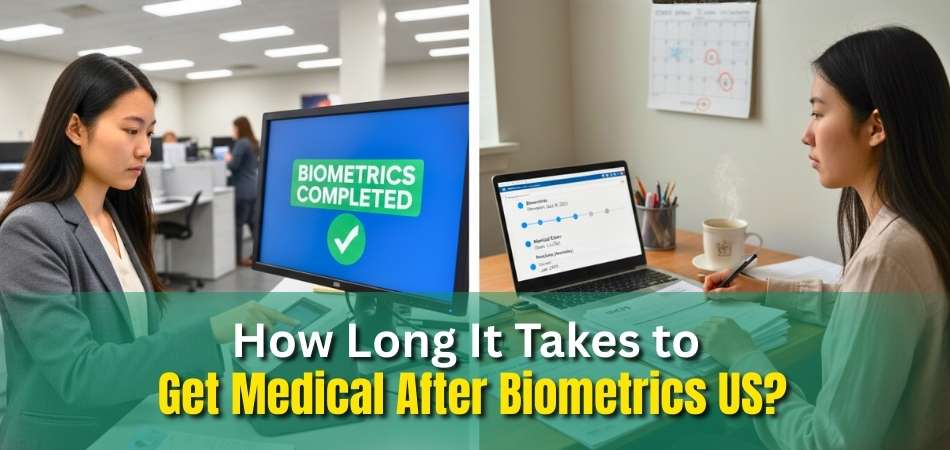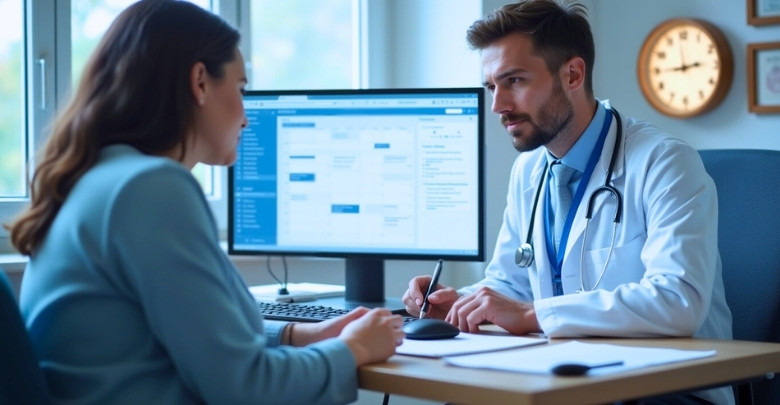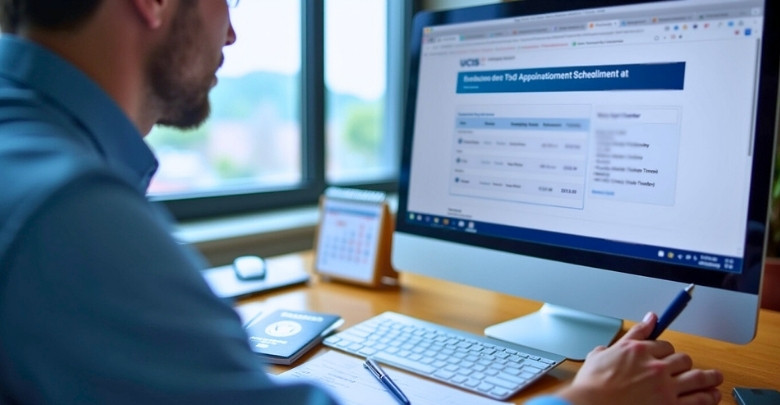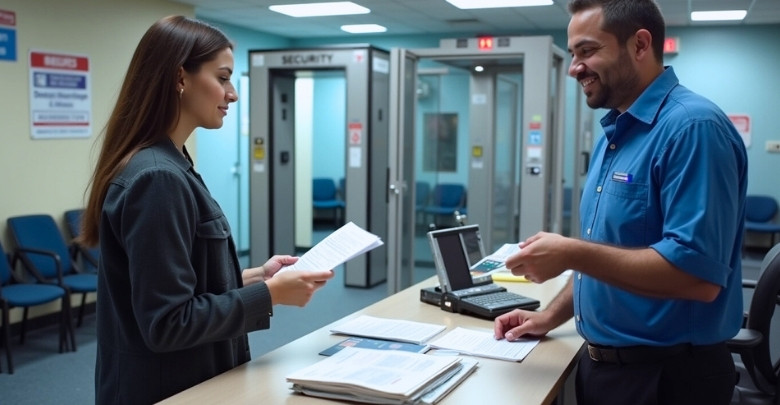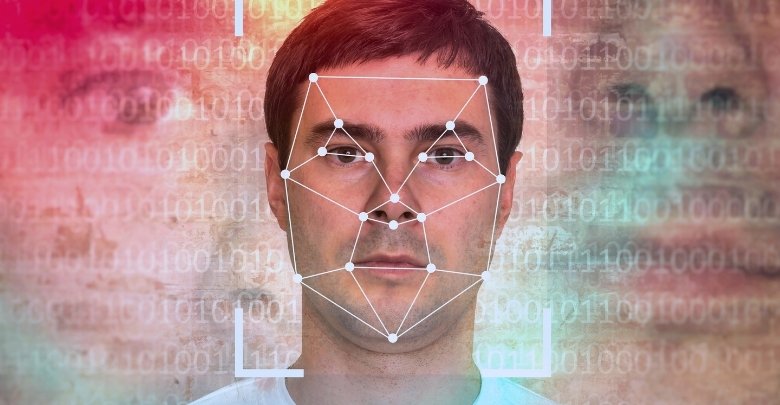The U.S. visa process involves several steps, including application submission, biometrics, medical exams, and interview scheduling. Applicants often wonder what happens after biometrics. Timing and procedures can vary depending on the visa category. Understanding the medical exam stage is important for proper planning and preparation.
If you’re asking how long it takes to get medical after biometrics US, the answer depends on your visa interview timeline.
There is no official U.S. government schedule linking biometrics directly to the medical exam. Most people schedule their medical 1–3 weeks before the visa interview, based on clinic availability, visa type, and embassy instructions.
Keep reading to understand timelines, common delays, and tips for faster processing. We’ll explain what to expect next. Don’t miss important details that could affect your approval. Get ready to navigate this step with clarity and confidence.
What Happens After Biometrics in the U.S. Visa Process?
After completing the biometrics appointment (which typically involves fingerprints and photos at a Visa Application Center or during a pre-interview visit, depending on the U.S. embassy or consulate), the standard process for an immigrant visa (consular processing) generally proceeds as follows.
Note that timelines and exact steps can vary by visa category, country, and specific post, but this reflects the policy-accurate flow based on U.S. Department of State guidelines. For nonimmigrant visas, medical exams are rarely required, and the process moves directly to the interview after biometrics. Here are the standard process flow after biometrics:
- Case continues processing: Your biometrics data is used for background and security checks (e.g., FBI name checks and fingerprint verification). This can take days to weeks, or longer if issues arise.
- Interview attendance (if not already attended): You attend the scheduled consular interview at the U.S. embassy or consulate. Bring all required documents, the sealed medical exam results (if applicable), and the DS-260 confirmation. The consular officer reviews your application, asks questions, and assesses eligibility.
- Medical exam review: If not already completed and submitted, the consular officer reviews the results from your medical exam (conducted by a panel physician). Any issues (e.g., missing vaccinations or health concerns) may delay processing.
- Visa decision: The officer makes a determination at or shortly after the interview. Possible outcomes:
- Approved: Your visa is issued, stamped in your passport, and returned (often via courier). You’ll receive a sealed immigrant packet to present at U.S. entry.
- Administrative processing (221(g)): If further review is needed (e.g., additional documents or security checks), you’ll be informed. This can take weeks to months; provide requested info promptly to avoid reapplication.
- Denied: Reasons are provided (e.g., ineligibility under immigration law). You may be able to address issues and reapply, but fees are not refunded.
- Post-approval steps (if approved): Pay the USCIS Immigrant Fee online for green card processing. Travel to the U.S. before the visa expires (typically 6 months). At the port of entry, present the sealed packet for admission as a lawful permanent resident. Your physical green card will be mailed to your U.S. address within weeks.
Received a Deficiency Notice After Biometrics? Here’s What It Means
Many applicants receive a Deficiency Notice (often printed on pink paper) after biometrics. This notice does not mean your case is delayed or denied.
It simply means USCIS is telling you:
“We know you have not submitted your medical exam yet. Do not send it now. Bring it to your interview or send it when we ask.”
This notice is common for Adjustment of Status cases. It is a reminder, not a warning.
Do not mail your medical exam unless USCIS sends a Request for Evidence (RFE) asking for it.
How Long It Takes to Get Medical After Biometrics US?
In the U.S. immigrant visa process (consular processing), the medical examination and biometrics are both preparatory steps that typically occur after you receive your interview appointment letter from the National Visa Center (NVC) but before your consular interview at a U.S. embassy or consulate.
There is no fixed “time after biometrics” to “get the medical” (whether meaning receiving instructions, scheduling the exam, or completing it), as these steps are often parallel rather than sequential.
The order and exact requirements can vary by country and specific U.S. posts-some require a separate biometrics appointment at a Visa Application Center (VAC), while others collect biometrics during the interview itself.
Key Factors Affecting Timing
- When instructions are provided: Medical exam instructions (including a list of approved panel physicians) are included in or accompany your interview appointment letter from the NVC. This letter is sent after your case is documentarily qualified (DQ), which can take weeks to months depending on your visa category, priority date, and processing backlogs. Biometrics instructions (if a separate appointment is needed) are also provided at this stage.
- Scheduling flexibility: You schedule both the medical exam and biometrics (if separate) yourself upon receiving the letter. There’s no required order between them—you can do the medical before, after, or around the same time as biometrics, as long as both are completed before your interview date.
- Overall timeline from interview notice to completion:
- Interviews are often scheduled 4–12 weeks after DQ (varies widely by post and demand; check current wait times on travel.state.gov).
- Schedule your medical as soon as you get the notice—it’s recommended at least 7–14 days before the interview to allow time for results processing (up to 96 hours in some cases).
- Biometrics, if separate, should also be done well in advance (e.g., at least a few days before the interview) to avoid cancellation.
- Results validity: Medical results must be valid (less than 6 months old) when you enter the U.S., so don’t do the exam too early.
| U.S. Post | Biometrics Timing | Medical Timing | Notes on Order/Timeline |
| Mumbai, India | Schedule separate appointments at VAC after receiving the interview letter; must complete before interview. | Schedule at panel physician as soon as letter is received; at least 7 days before interview (results may take 4–7 days). | Parallel steps; no fixed order—do both promptly after notice (interview often 4–8 weeks out). |
| London, UK | Often collected during the interview (no separate appointment mentioned). | Schedule as soon as the interview letter is received; complete before interview. | Medical before interview; biometrics at interview. Timeline from notice: Weeks to prepare. |
| General (Other Posts) | If separate, schedule after the letter; before the interview. | As soon as the letter was received; 1–2 weeks before the interview was recommended. | Both after notice; applicant chooses order. Delays in results or scheduling can push back processing. |
Is There a Fixed Waiting Time for Medical After Biometrics?
No, there is no fixed or guaranteed waiting time. As of 2026, USCIS and the U.S. Department of State do not publish any official timeline that specifies how long after biometrics an applicant will receive instructions to complete a medical exam. It is important to understand three key facts:
- Biometrics do not trigger the medical exam: Completing biometrics (fingerprints and photos) is a separate security step. It does not automatically start the medical exam process, nor does it place you in a queue for medical scheduling.
- Medical exams are linked to interview readiness: For most U.S. visa cases, medical exams are required before the visa interview, not after biometrics. Applicants usually receive medical instructions only when their case is close to interview scheduling or when an interview notice has been issued.
- Timing depends on visa workflow, not fingerprinting: Factors such as visa category, consulate workload, interview availability, and local panel physician capacity determine when medical instructions are issued. Biometrics completion alone does not control this timing.
In simple terms: biometrics confirm identity, while medical exams confirm admissibility. Because they serve different purposes, they follow different timelines and are not directly connected.
Does Medical Timing Differ by Visa Type?
Yes. Medical exam timing varies significantly depending on the type of U.S. visa you are applying for. Each visa category follows a different workflow, and this directly affects when and how the medical exam is completed.
Immigrant Visas (Family-Based & Employment-Based)
For immigrant visas processed through a U.S. embassy or consulate:
- A medical exam is mandatory for all applicants.
- The medical must be completed before the visa interview.
- In most cases, applicants receive medical instructions after the interview notice is issued, not immediately after biometrics.
- Embassies often advise scheduling the medical a few weeks before the interview to ensure results are valid and available.
Here, medical timing is closely tied to interview readiness, not fingerprinting completion.
Non-Immigrant Visas
For non-immigrant visas (such as work, study, exchange, or temporary visas):
- Not all visa types require a medical exam.
- A medical may be required if:
- The applicant plans to work in certain fields (e.g., healthcare, childcare)
- The stay exceeds a specific duration
- The applicant has a prior medical history that raises concerns
- Embassy- or consulate-specific instructions apply, and requirements can vary by country.
Applicants should rely strictly on their interview appointment letter or embassy guidance, as biometrics alone does not determine medical needs in non-immigrant cases.
Adjustment of Status (Inside the U.S.)
For applicants applying from within the United States:
- Medical exams are governed by USCIS Form I-693.
- The medical may be:
- Submitted together with the application, or
- Submitted later upon USCIS request.
- There is no interview-linked scheduling requirement in many cases.
- Biometrics and medical exams follow separate internal timelines within USCIS.
In adjustment-of-status cases, medical timing is tied to application processing stages, not embassy interviews.
Key takeaway:
Medical exams are not scheduled using a single universal rule. The visa category determines whether a medical is required, when it must be completed, and which authority controls the timing. For those attending conferences in USA, understanding your specific visa pathway is key to avoiding delays or early medicals.
How Country and Embassy Affect Medical Scheduling?
Medical exam timing is not only influenced by visa type but also by where you apply from. U.S. embassies, consulates, and USCIS offices follow the same federal rules, but local capacity and procedures can significantly affect how quickly applicants can complete their medical exams.
Applicants Outside the U.S.
For applicants processing their visas through a U.S. embassy or consulate abroad:
- You must use an approved panel physician designated by the U.S. Department of State. Medical exams from unapproved doctors are not accepted.
- The embassy or consulate controls the timing instructions. Applicants are usually told when to schedule the medical, often after receiving the interview appointment.
- Appointment availability depends on:
- The number of authorized panel physicians in that country
- Local clinic workload and staffing
- Seasonal demand and interview backlogs
In high-volume countries, limited panel physicians can lead to longer waits, even after interview notices are issued.
Applicants Inside the U.S.
For applicants applying from within the United States (most commonly through Adjustment of Status):
- Medical exams must be completed by a USCIS-approved civil surgeon.
- Availability varies by location, with some areas offering same-week appointments and others requiring several weeks of waiting.
- Medical timing is influenced by USCIS processing pace, including:
- When USCIS requests Form I-693
- Whether the medical is submitted with the application or later in the process
In these cases, applicants often have more flexibility, but delays can still occur if civil surgeons are booked or if USCIS processing slows.
Panel Physician vs Civil Surgeon (Quick Comparison)
| Feature | Panel Physician | Civil Surgeon |
| Used for | Embassy and consulate visas | Adjustment of Status inside the U.S. |
| Appointed by | U.S. Department of State | USCIS |
| Where exam is done | Outside the U.S. | Inside the U.S. |
| Medical form | Clinic sends results to embassy | Form I-693 |
| Validity | Usually 6 months | Indefinite if signed after Nov 1, 2023 |
| How submitted | Bring to interview or sent electronically | Submitted with AOS or after RFE |
Even with the same visa category, applicants may experience very different medical scheduling timelines simply because of country-specific clinic capacity, embassy instructions, or local USCIS workloads. Always follow the guidance issued by your specific embassy or USCIS office to avoid unnecessary delays.
Common Reasons for Medical Delays
Delays in completing a U.S. visa medical exam are common and usually not caused by the applicant. Below are the most frequent reasons applicants experience slower medical scheduling or extended processing times:
- Interview not yet scheduled: In most cases, medical exams are completed shortly before the visa interview. If an interview date has not been issued, medical instructions may not be sent yet.
- Limited panel physician appointments: Some countries have only a few approved panel physicians. High demand, seasonal travel, or clinic capacity limits can lead to long appointment wait times.
- Missing or incomplete vaccination records: If required vaccination documentation is unavailable, clinics may delay completion while records are verified or vaccines are administered.
- Additional tests or follow-up examinations required: Certain medical conditions may require extra testing, specialist reviews, or repeat exams, which can extend processing time.
- Administrative or staffing backlogs: Embassies, clinics, and USCIS offices may experience delays due to staffing shortages, system updates, or high application volumes.
These delays usually pause the case temporarily but do not mean the visa application is denied. Understanding these common causes helps applicants plan realistically and avoid unnecessary stress.
Can I Do My Medical Exam Before Being Asked?
In some cases, yes—but it depends on your visa type and where you are applying from. While early scheduling may seem like a way to save time, it can also create problems if done incorrectly.
When Early Scheduling Is Allowed
- Adjustment of Status applicants inside the U.S. may complete the medical exam early and submit Form I-693 with their application, if USCIS allows it.
- Some embassies permit applicants to schedule the medical exam after receiving the interview appointment, even if explicit medical instructions have not yet arrived.
- Early scheduling is more feasible when interview dates are already confirmed and clinic availability is limited.
Always confirm with official embassy or USCIS instructions before booking early.
Risks of Medical Results Expiring
- U.S. visa medical exams have limited validity periods.
- If the visa interview or final decision is delayed, medical results may expire before visa issuance.
- Expired medical exams require a repeat exam, which means extra cost and time.
This is one of the most common mistakes applicants make when scheduling too early.
Why Embassies Often Advise Waiting
- Embassies time medical exams to align with interview readiness.
- Waiting reduces the risk of expiration or repeat testing.
- It ensures medical results are current when the visa officer reviews the case.
What If My Interview Is Waived?
Many employment-based and some family-based Adjustment of Status cases now have interview waivers.
If your interview is waived, USCIS will send you a Request for Evidence (RFE) asking you to mail your medical exam instead of bringing it to an interview.
Important:
Do not mail your medical exam until USCIS sends the RFE. Sending it early can cause it to be lost or rejected.
Unless official guidance clearly allows early scheduling, it is usually safer to wait until you receive medical instructions or an interview notice. This careful approach aligns well with the biometric requirement for US visa process, helping applicants avoid mistakes, reduce delays, and keep their visa application moving smoothly without unnecessary risks..
What Comes Next After You Complete the Medical?
After your medical exam, the panel physician or civil surgeon sends the results directly to the U.S. embassy, consulate, or USCIS. In some locations, you may receive sealed documents or digital confirmation, which must remain unopened and submitted as instructed.
What Visa Officers Review
Immigration officers review your medical results to confirm that:
- Required vaccinations are complete
- No medical conditions affect admissibility
- All exam components meet U.S. immigration health standards
This review focuses on eligibility, not general health quality.
Cleared
If no issues are found, your medical exam is marked as complete. Your visa application continues to the next processing stage without medical-related delays.
Additional Tests Requested
If the doctor identifies a condition that requires clarification, you may be asked to complete further tests, provide specialist reports, or attend follow-up exams. This can extend processing time.
Administrative Review
In some cases, medical results require internal review by health or immigration authorities. This does not mean refusal, but it may temporarily pause the application.
Medical Inadmissibility Assessment
If a condition falls under U.S. immigration medical inadmissibility rules, officers will assess whether a waiver or additional documentation is possible. Each case is reviewed individually.
How Long are U.S. Visa Medical Results Valid?
Understanding the validity period of U.S. visa medical results is essential, because completing the exam too early or too late can affect the progress of your application.
Important Update on I-693 Validity (As of 2023–2026)
For applicants applying inside the United States using Form I-693, USCIS changed the rules.
Any medical exam signed by a civil surgeon on or after November 1, 2023 does not expire as long as your adjustment of status application remains pending.
This means you do not need to repeat your medical exam even if your case takes a long time to process.
This rule only applies to Adjustment of Status (AOS) cases inside the U.S. It does not apply to embassy or consular medical exams.
Typical Validity Periods
U.S. visa medical exam results are generally valid for up to six months. In some cases, the validity period may be shorter, especially if the applicant has certain medical conditions that require monitoring. For applicants inside the U.S., medical exams submitted using USCIS Form I-693 are valid only for the specific application they are filed with.
Why Timing Matters
Medical exams must be valid at the time a visa decision is made. If processing delays occur and the medical results expire, officers cannot finalize the case. This is why embassies and USCIS often recommend completing the medical exam close to the interview or request date, rather than immediately after biometrics.
What Happens If Results Expire
If your medical results expire before your visa is issued or your application is approved, you will need to repeat the medical exam. This can lead to additional costs, new appointments, and further delays in processing.
What If My Interview Is Waived?
Many employment-based and some family-based Adjustment of Status cases now have interview waivers.
If your interview is waived, USCIS will send you a Request for Evidence (RFE) asking you to mail your medical exam instead of bringing it to an interview.
Important:
Do not mail your medical exam until USCIS sends the RFE. Sending it early can cause it to be lost or rejected.
How to Prepare for Your Medical Exam?
Preparing properly for your medical exam helps avoid delays, repeat visits, and extra costs during visa processing stages. Simple planning, organized documents, and clear understanding of clinic expectations will help you complete the exam smoothly and keep your application moving forward without unnecessary stress.
Appointment Confirmation
Bring your appointment confirmation to prove your booking and avoid entry issues at the clinic. Clinics often check timing strictly and reject late arrivals. Keep a printed copy and a phone backup ready to prevent confusion during check-in.
Passport
Your passport confirms identity and links medical results to your visa case correctly. Ensure it matches your application details and remains valid. Clinics compare passport data carefully, so check spelling and numbers before arrival to avoid reporting errors.
Vaccination Records
Vaccination records show compliance with U.S. health rules and help doctors skip unnecessary repeat shots. Carry original documents when possible. These records often align with required documents for biometrics and support faster medical clearance during exam review.
Fees
Medical exam fees vary by country, clinic, and required tests, so confirm costs early. Some clinics accept only cash or cards. Paying correctly prevents rescheduling and keeps your visit efficient, smooth, and focused on completing required examinations quickly.
Prior Medical History
Bring records of past treatments, chronic conditions, and prescriptions to answer doctor questions clearly. Honest details help doctors decide testing needs. Clear medical history reduces follow-up visits and avoids delays caused by missing or unclear health information.
Frequently Asked Questions
Below are frequently asked questions that address practical concerns applicants still have after biometrics. They focus on timing, next steps, and real-world issues people face while waiting. Each answer gives clear, easy guidance without repeating earlier topics.
Does Completing Biometrics Speed Up Medical Scheduling?
Completing biometrics does not speed up medical scheduling. Biometrics only confirm identity and security details. Medical instructions usually depend on interview readiness, case workload, and embassy procedures. Finishing biometrics early does not move a case ahead in the medical queue.
Can Medical Be Delayed Even After Biometrics Are Approved?
Yes, medical scheduling can still be delayed after biometrics approval. Interview backlogs, limited clinic appointments, staffing shortages, or embassy workload often slow the process. These delays are common and usually unrelated to the applicant’s documents or background checks.
Will Medical Delays Affect My Overall Visa Decision?
Medical delays usually pause processing but do not harm your visa decision. Officers cannot finalize cases without valid medical results. Once you complete the exam and results arrive, processing normally resumes without penalties or negative marks caused by the waiting period.
How Will I Know When It’s Time To Schedule My Medical Exam?
You will know it is time when you receive official instructions from USCIS or the embassy. These instructions may appear in your online account, interview notice, or email. Clinics should not be booked until official guidance confirms readiness.
Do All Applicants Receive Medical Instructions At The Same Stage?
No, applicants do not receive medical instructions at the same stage. Timing varies based on visa category, case complexity, interview availability, and country. Two applicants with similar biometrics dates may receive medical instructions weeks or months apart.
Can Clinic Availability Change My Medical Timeline?
Yes, clinic availability strongly affects medical timelines. Some regions have limited approved physicians, causing longer waits. High demand periods, holidays, or staffing shortages can extend booking times even when your case is otherwise ready.
Should I Contact USCIS Or The Embassy If Medical Takes Too Long?
You may contact USCIS or the embassy if the delay becomes excessive and your case shows no movement. Use official inquiry channels only. Frequent or unnecessary follow-ups rarely speed up scheduling and may increase frustration instead.
Concluding Thoughts
Accurate application details play a major role in avoiding delays during visa processing. When you enter correct information, officers move faster and trust your file more. If you spot a mistake, act quickly by following official correction steps or submitting updated documents.
Ignoring errors can cause holds, repeat requests, or even refusal. Many applicants worry about how long it takes to get medical after biometrics US, but small errors often create bigger delays than timelines themselves. Careful review saves time, money, and stress. A calm approach, clear records, and timely fixes keep your case moving forward without unnecessary trouble.


